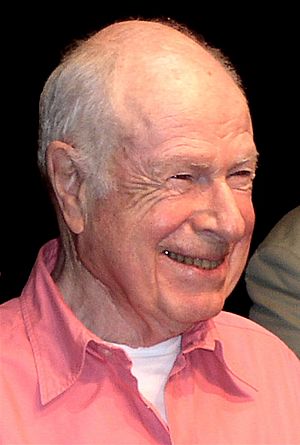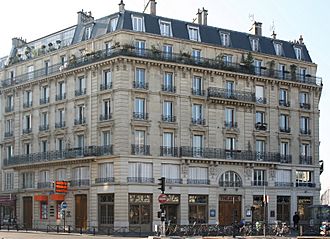Peter Brook facts for kids
Quick facts for kids
Peter Brook
|
|
|---|---|

Brook in 2009
|
|
| Born |
Peter Stephen Paul Brook
21 March 1925 Chiswick, England
|
| Died | 2 July 2022 (aged 97) Paris, France
|
| Occupation | Theatre and film director |
| Years active | 1943–2022 |
| Spouse(s) |
Natasha Parry
(m. 1951; died 2015) |
| Children |
|
| Relatives |
|
Peter Stephen Paul Brook (born March 21, 1925 – died July 2, 2022) was a famous English theatre and film director. He was known for his creative and often simple approach to theatre.
He started his career in England in 1945. He worked at the Birmingham Repertory Theatre and the Royal Opera House. From 1962, he worked with the Royal Shakespeare Company (RSC). With the RSC, he directed the first English version of Marat/Sade in 1964. This play moved to Broadway in 1965 and won a Tony Award for Best Play. Peter Brook also won the Best Director award for it. He also directed films, like the well-known Lord of the Flies in 1963.
In the early 1970s, he moved to France. There, he started an international theatre group. This group performed in many countries, including developing nations. They focused on keeping their shows very simple. People often called him "our greatest living theatre director." He won many awards, including Emmy Awards, a Laurence Olivier Award, and the Japanese Praemium Imperiale. In 2021, he received India's Padma Shri award.
Contents
Early Life and Education
Peter Brook was born on March 21, 1925, in Chiswick, England. He was the second son of Simon and Ida Brook. His parents were Lithuanian Jewish immigrants from Latvia.
His older brother, Alexis, became a psychiatrist. His first cousin, Valentin Pluchek, was a main director at the Moscow Satire Theatre. Peter Brook went to Westminster School and Gresham's School. He then studied languages at Magdalen College, Oxford until 1945. He did not serve in World War II because he was sick as a child.
Career Highlights
Peter Brook directed his first play, Marlowe's Dr Faustus, in 1943. This was at the Torch Theatre in London. In 1945, he worked at the Birmingham Repertory Theatre.
Working in England
In 1947, Brook became an assistant director at the Shakespeare Memorial Theatre in Stratford-upon-Avon. From 1947 to 1950, he was the Director of Productions at the Royal Opera House in London. He directed Puccini's La bohème and Richard Strauss's Salome there. The Salome production was quite talked about because of its sets by Salvador Dalí.
From 1962, he worked with Peter Hall as a director for the Royal Shakespeare Company (RSC). In 1964, they put on the first English version of Marat/Sade. This play was a huge success and moved to Broadway. It won the Tony Award for Best Play, and Brook won for Best Director. In 1966, they presented US, a play that protested the Vietnam War.
Key Influences
Peter Brook was inspired by many theatre ideas. He was influenced by Antonin Artaud and his "Theatre of Cruelty." This idea explored new ways to express feelings and train actors.
He also said that Joan Littlewood was "the most galvanising director in mid-20th century Britain." Brook's work was also shaped by the ideas of Jerzy Grotowski, Bertolt Brecht, and others.
Working with Others
Brook worked with many talented people. These included actors like Paul Scofield, John Gielgud, and Glenda Jackson. He also worked with designers like Sally Jacobs and writers like Ted Hughes.
International Theatre Work
In 1971, Peter Brook and Micheline Rozan started the International Centre for Theatre Research. This was a group of actors, dancers, and musicians from different countries. They traveled a lot in the Middle East and Africa in the early 1970s.
Since 1974, the group has been based in Paris at the Théâtre des Bouffes du Nord. They performed in many places, including immigrant hostels and refugee camps. Sometimes, they performed for people who had never seen a play before.
The Mahabharata
In the mid-1970s, Brook and writer Jean-Claude Carrière started working on the Indian epic poem Mahabharata. They turned it into a stage play, which was first performed in 1985. Later, it became a TV mini-series.
Many people praised the play. The New York Times said it tried to turn Hindu stories into art for everyone. However, some scholars felt the play didn't fully capture the "Indianness" of the epic.
In 2015, Brook returned to the world of The Mahabharata with a new play called Battlefield.
Tierno Bokar
In 2005, Brook directed Tierno Bokar. This play was about the life of a Malian Sufi teacher named Tierno Bokar. The play was about his life and his message of religious tolerance.
Personal Life
In 1951, Peter Brook married actress Natasha Parry. They had two children: Irina, who became an actress and director, and Simon, who became a director. Natasha Parry passed away in 2015.
Peter Brook died in Paris on July 2, 2022, when he was 97 years old.
Notable Works
Peter Brook's work is kept in places like the Academy of Arts, Berlin.
Shakespeare Plays
Brook loved the plays of William Shakespeare. He directed many of them in England and other countries, and also made films of them.
- In 1945, he directed King John.
- He directed Measure for Measure in 1950 and The Winter's Tale in 1952, both with John Gielgud.
- In 1955, he directed Hamlet Prince of Denmark with Paul Scofield.
- He also directed Titus Andronicus with famous actors Laurence Olivier and Vivien Leigh in 1955.
For the Royal Shakespeare Company, he directed King Lear with Paul Scofield in 1962. He also created a very famous version of A Midsummer Night's Dream in 1970. This play had a unique design by Sally Jacobs. He also directed a film version of King Lear in 1971.
Later, he continued to direct Shakespeare plays in French at the Théâtre des Bouffes du Nord. These included Timon d'Athènes (1974) and Mesure pour mesure (1978).
In 2000, he directed The Tragedy of Hamlet with Adrian Lester. He also directed a TV film version in 2002.
Other Major Productions
Peter Brook directed many other important plays throughout his career. Some of these include:
- 1956: A View from the Bridge by Arthur Miller
- 1964: Marat/Sade by Peter Weiss
- 1975: Les Iks, based on a book by Colin Turnbull
- 1979: La Conférence des oiseaux (The Conference of the Birds)
- 1981: La Cerisaie by Anton Chekhov
- 1985: Le Mahabharata (The Mahabharata)
- 1990: La Tempête by William Shakespeare
- 2004: Tierno Bokar, based on the life of Tierno Bokar
- 2011: A Magic Flute, an adaptation of Mozart's opera The Magic Flute
- 2015: Battlefield, another play from The Mahabharata
Films Directed
Peter Brook also directed several films:
- 1960: Moderato Cantabile
- 1963: Lord of the Flies
- 1967: Marat/Sade
- 1971: King Lear
- 1979: Meetings with Remarkable Men
- 1989: The Mahabharata
Awards and Honours
Peter Brook received many awards and honours for his work:
- Tony Award for Best Direction of a Play for Marat/Sade (1966) and A Midsummer Night's Dream (1971)
- Laurence Olivier Award (1983)
- Emmy Award for La tragédie de Carmen (1984)
- Prix Italia (1984)
- Europe Theatre Prize (1989)
- International Emmy Award for The Mahabharata (1990)
- Kyoto Prize in Arts and Philosophy (1991)
- Praemium Imperiale (1997)
- Dan David Prize (2005)
- The Ibsen Award (2008)
- Commander of the Order of the British Empire (1965)
- Inducted into the American Theater Hall of Fame (1983)
- Companion of Honour (1998)
- Princess of Asturias Award in Arts (2019)
- Padma Shri from India (2021)
See also
In Spanish: Peter Brook para niños
 | Georgia Louise Harris Brown |
 | Julian Abele |
 | Norma Merrick Sklarek |
 | William Sidney Pittman |


